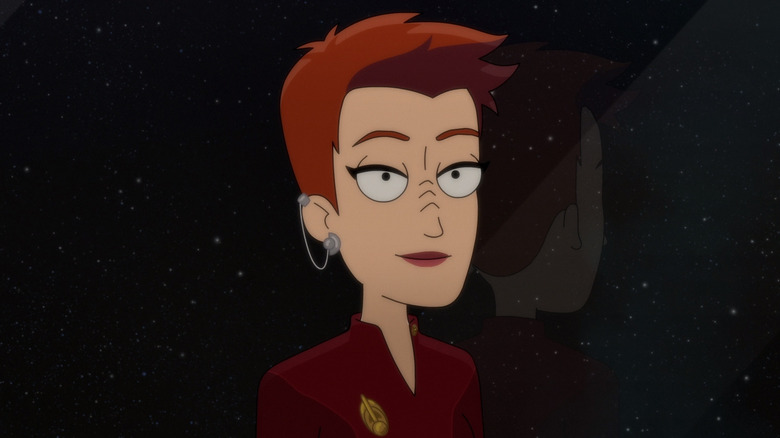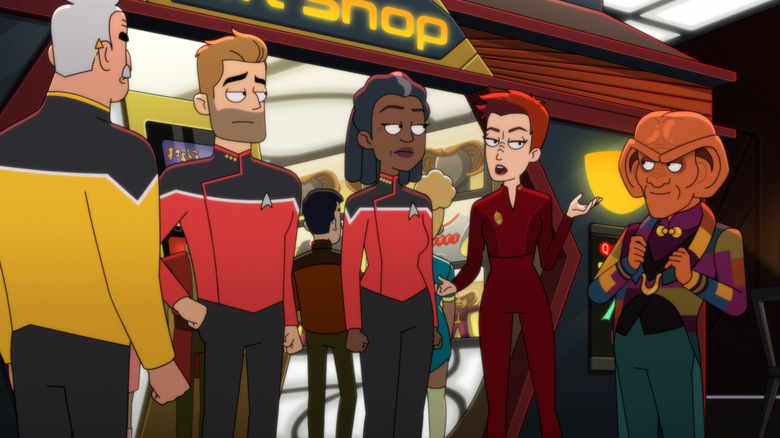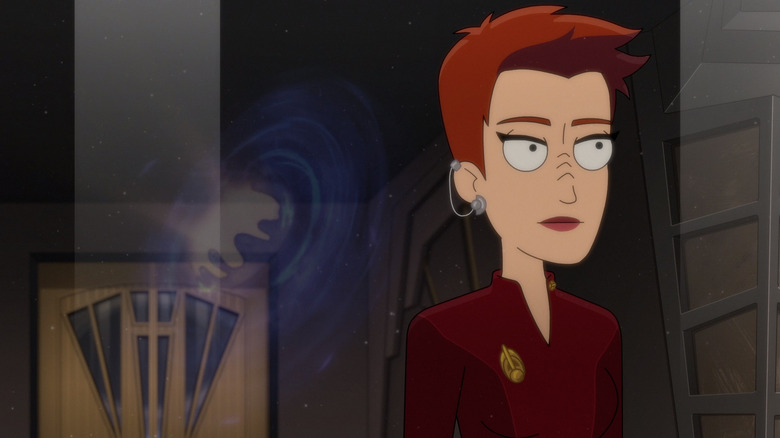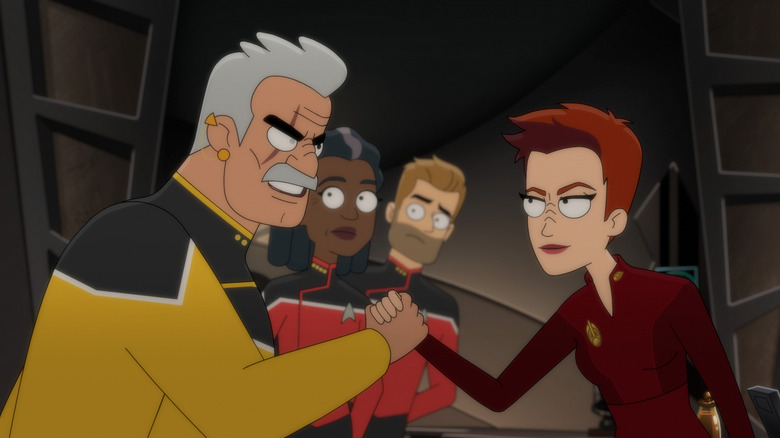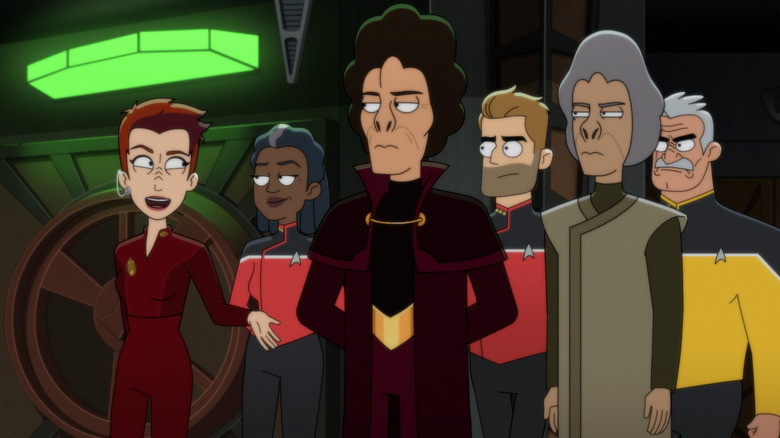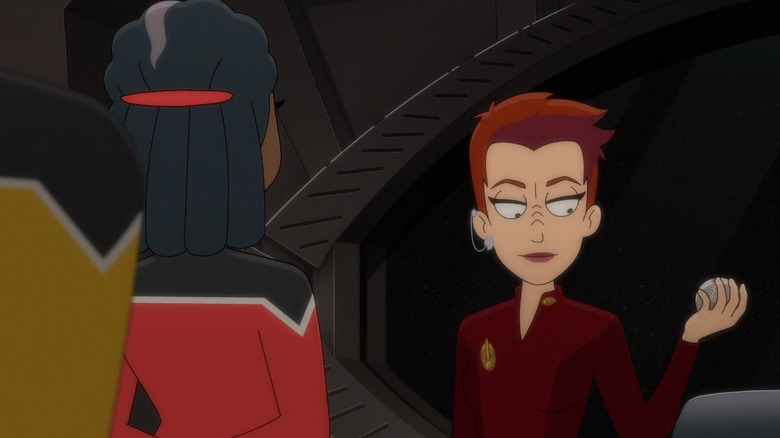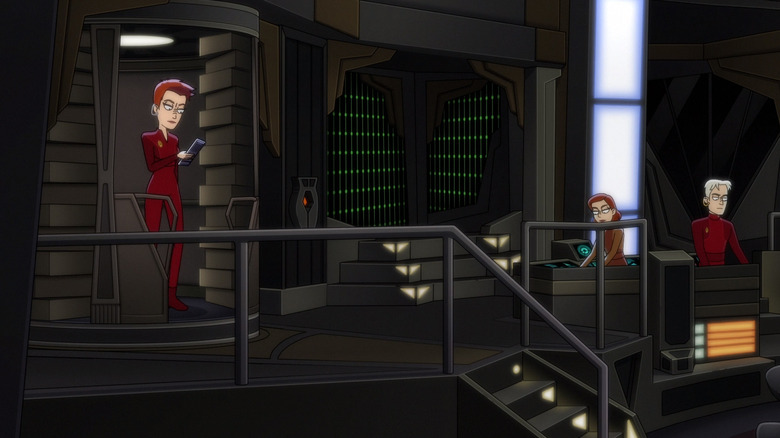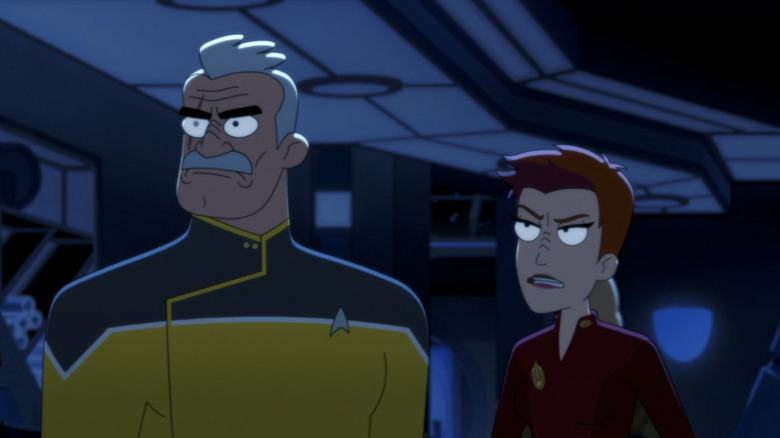Star Trek: Deep Space Nine Star Nana Visitor Chats About Her Lower Decks Appearance [Exclusive Interview]
This interview contains spoilers for "Star Trek: Lower Decks" season 3, episode 6.
"Star Trek: Lower Decks" has done an incredible job balancing irreverent humor with deep reverence for what's beloved about "Star Trek," and this week's journey to Deep Space Nine is no different. The U.S.S. Cerritos docks at the space station to deliver a whole mess of booze and help with a diplomatic mission, and maybe do a little sightseeing along the way.
It's been seven or eight years since the events of the "Star Trek: Deep Space Nine" finale, and while some things onboard the former Cardassian vessel have changed, others remain exactly the same. Morn haunts his usual spot, Quark (Armin Shimerman) is up to no good, and Major Colonel Kira Nerys (Nana Visitor) is a no-nonsense leader who handles it all in stride. In the episode, "Hear All, Trust Nothing," Colonel Kira gets a chance to make a baseball reference on behalf of Captain Sisko, share war stories with another Bajoran resistance fighter, and help deal with a diplomatic disaster. All in a day's work, or a day's "Star Trek" episode!
I had the absolute pleasure of chatting with Visitor via phone (err ... communicator?) about her "Lower Decks" appearance, her feelings about Kira's legacy, and so much more. It turns out that not only was Visitor already a fan of "Lower Decks," but she would be game to do more, which should be music to any "Star Trek" fans' faux-pointed ears.
This interview has been lightly edited for clarity.
'I already knew that I was a fan of what they were doing.'
How did you get involved with joining "Lower Decks" for an episode?
You know, I'd seen the show, so I already knew that I was a fan of what they were doing. And then, it's the same as when I got "Deep Space Nine." It was a call from my agent. It's so boring. It's not like some interesting meet, amazing thing. It's just like, "Hey, they have a job for you." And it's like, "Yeah, I'd love to."
Were you surprised to learn that not too much had changed on Deep Space Nine in the eight years since the end of that series and the events of "Lower Decks"?
I was actually thrilled. I was thrilled because some books have me, my character, becoming a Vedic or this or that, and I really loved that she was still in there doing her thing.
'I do have this fantasy that Sisko is an orb.'
What do you think Kira has been up to in that time, besides doing her thing?
I'm sure she's got a lot to do with Bajor, but I would hope that she's still on the space station, very much the way Sisko was keeping things going. I do have this fantasy that Sisko is an orb, is able to talk to her, and give her advice. And that Cirroc [Lofton] in some way is still there as Jake. And yeah, I've got this whole little fantasy going of what it's like there. But just like I continue in my life, that's how I see her still doing her thing out there.
'Being Bajoran has allowed me to play the most human character I've ever played.'
In the episode, we get to see Kira reunite with an old war buddy, Shaxs. How was it getting into all those gritty details of the Bajoran Resistance again? And were you surprised by anything in the script?
No, I loved it. I really loved it. It's such an interesting way to work on animation because it's a different tone, because you have to put everything that you would put in your body and in your face into your voice. It's so different but somehow just as creative. So I loved that. I loved that she had war buddies and that she shared this and this one-upmanship, which is such a human thing. I do say this, that being Bajoran has allowed me to play the most human character I've ever played.
In that same sort of vein, Kira's such a unique character because she's both a freedom fighter and a terrorist, depending on your point of view. Was it challenging bringing that complexity to the screen?
No, because some of that, as you point out, is how people perceive her. For her, she had goals and intentions set for her people, and that makes for a very clear path. So it's not confusing, but the way she was perceived is in this binary way. Is she good or is she bad? Well, she was both.
'She is so ingrained in me.'
Did you have any requests for your animated version or for things that you wanted to see in the episode?
No, I was really interested to see how she would be drawn, how 30 years might look on her if that's what it was. But of course, it's not, it's their own timeline and who knows what space does in terms of all those things anyway. So it was fun that she was really recognizable to me. I enjoyed that.
And what was it like being in character as her again? Even if it is voice only and you had to do it a little differently, what was it like just stepping into those boots again?
So easy. I mean, it's really, it's a character. I mean, first of all, those seven years were like dog years. One year equals seven years, so I was Kira for 49 years, and she is so ingrained in me. Really, she actually shifted who I was, which makes sense when you think of ... You dropped thoughts in your head, and it actually changes the way your brain synaptically forms. So I was shifted by this character in really good ways, in having to accept foibles and having to self-examine. She did a lot of good for me. So it's joyful for me to step into who she is.
'I felt compelled not to play it safe.'
"Deep Space Nine" had some struggles with fans and critics during its run, but has developed a cult following with seriously intense fans. I'd say out of all the Treks, "Deep Space Nine" fans are the most hardcore. I was wondering, did you ever expect it to get more love as time went on?
No, no, no. And it was so hard at the time that it didn't. And I was so aware of my character, my character, in particular, maybe just because it was personal, not being accepted. It wasn't what culture wanted women to be, especially in the '90s. I was breaking all kinds of rules and expectations and that wasn't fun. And yet, somehow, I felt compelled not to play it safe. It was like, "No, I got the ball. I was thrown this ball and I'm going to run until someone stops me." And that really was my feeling. It was like, "Well, they may fire me, but I'm just going to keep running until they do."
'Star Trek offers hope, and it offers a way to get there.'
With "Lower Decks" and "Strange New Worlds," it feels like we're back in that golden era of "Trek" when "Deep Space Nine" and "Next Generation" were both on the air. Why do you think "Star Trek" is really resonating with people again?
Oh boy. I mean, it's huge, right? It's a huge question, but my answer feels huge in saying that "Star Trek" offers hope, and it offers a way to get there. I'm reading Frank White's book, "The Overview Effect," and it's basically talking about how astronauts, once they see the world from the perspective of space, all the separations, all the issues, all the fighting just seem silly. We're all spacemen on this planet, all together spinning around. So I think "Star Trek," by being set in the future, gives people a very safe, non-threatening way to look at new ideas, to look at diversity, to look at what's next, to look at space travel and what engineers and space engineers and astronauts and scientists are seeming to tell us where we need to go. We need to go up and out, not only for the exploration and for the opportunities, but also to help the Earth.
I interviewed because I'm doing a book on the women of "Star Trek," and not just the women who were involved in making it, but the women who were affected by it. And I was recently at ESA, and the satellites that they have up in the air, some people can have this feeling that it's all about we're spending a lot of money on just space. But no, we're spending a lot of money in figuring out, which just happened yesterday, what do we do if there's some big rock coming at us? Can we divert it? What's going on with the weather? I mean, satellites are a huge way for us to understand ourselves and the Earth.
So all of that, and making new little scientists and sparking interests, and this woman growing up in the Italian mountains who watches "Star Trek" and goes, "Oh, it's okay for a woman to be an engineer." And she grows up to be Samantha Cristoforetti. She's a fighter pilot, and goes up to the Space Station and tells people what brushing their teeth is like in space. That's why it's important.
'It's very hard to find as meaningful work.'
Would you be interested in coming back for any more "Trek," either animated or live-action, down the road?
Oh, yes. Yes. I mean, it's very hard to find as meaningful work, I have to say, as something that is created, not only to entertain but also to offer possible views of what we look like in the future.
New episodes of "Star Trek: Lower Decks" premiere Thursdays on Paramount+, and the entirety of "Star Trek: Deep Space Nine" is available on Paramount+.
